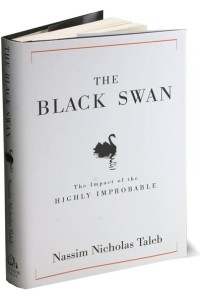This article was originally published on May 29th, 2010. Since then, Nassim has continued to be controversial and thought-provoking. And I like having my thoughts provoked!
Big Thought
Definition of a black swan event:
“First, it is an outlier, as it lies outside the realm of regular expectations, because nothing in the past can convincingly point to its possibility. Second, it carries an extreme impact. Third, in spite of its outlier status, human nature makes us concoct explanations for its occurrence after the fact, making it explainable and predictable. I stop and summarize the triplet: rarity, extreme impact, and retrospective (though not prospective) predictability.” (pg xvii)
Ideas, Implications, Questions
- The Black Swan is a book so densely packed with thought-provoking content that it’s hard to pick the key ideas that cover all of Nassim’s theses. But a few thoughts (besides the titular black swan) do stand out:
- Nassim makes a distinction between two different types of event distribution; what he calls Extremistan and Mediocristan. Mediocristan encompasses events where there can’t be much variability in the measurements – for example, the height of a person. No matter how much you look, you won’t find a 20–foot-tall person. By contrast, “in Extremistan, inequalities are such that one single observation can disproportionately impact the aggregate, or the total.” (page 33) An example would be individual wealth; if you have a big enough sample, most people will hover around a certain amount of money, but you will also have someone like Bill Gates who skews the results. He makes the argument that most of the modern world is not governed by the rules of Mediocristan, but rather Extremistan; “almost everything in social life is produced by rare but consequential shocks and jumps.” (pg xxiv)
- In contrast to the internet-driven, multiple streams of income craze of the the last 10 years, Nassim points out the scalable professions, any arena where effort can be separated from results (e.g. writing and selling a book, audio-program, or e-book), are prone to the unequal distribution of results. For example, J.K. Rowlings has sold millions of Harry Potter books, while over 90% of books sell less than 1,000 copies. A scalable profession is only good if you are successful in it, just ask the hordes of starving actors. So it’s always a gamble to work in a field that is subject to “Extremistan”. (pg 106)
- Beware of experts! Nassim points out that in many fields (for example, finance), “experts” are no better at making predictions about the future than anyone else. This is because there are so many variables involved, and because there is always the chance of a Black Swan event. It becomes more of a problem when the experts “don’t know what they don’t know.” (pg 147). This is what Nassim calls epistemic arrogance – we won’t acknowledge the limits of our knowledge.
- The best single idea I got from the Black Swan is this: “Missing a train is only painful if you run after it! Likewise, not matching the idea of success others expect from you is only painful if that’s what you are seeking. “ (pg 297). I remember this every time I just miss the train – it’s only a problem if I needed to be on that particular train, and as humans, we’re very bad at figuring out need.
Should you read this book? Who should read this book?
Absolutely. I think that The Black Swan is one of the most intellectually compelling books I’ve read, if not the most. I think that Nassim points out fundamental problems that we’ve created in our economic and social systems and recognizing these challenges is the first step to solving them. For example, the problems in the financial markets in the last 2 years are driven by the black swan effect and the narrative fallacy. The faster we recognize the limits of our thinking, the faster we can minimize the impact of future calamities.
Read this if you are:
- Human – yes, I think everyone should read it.

